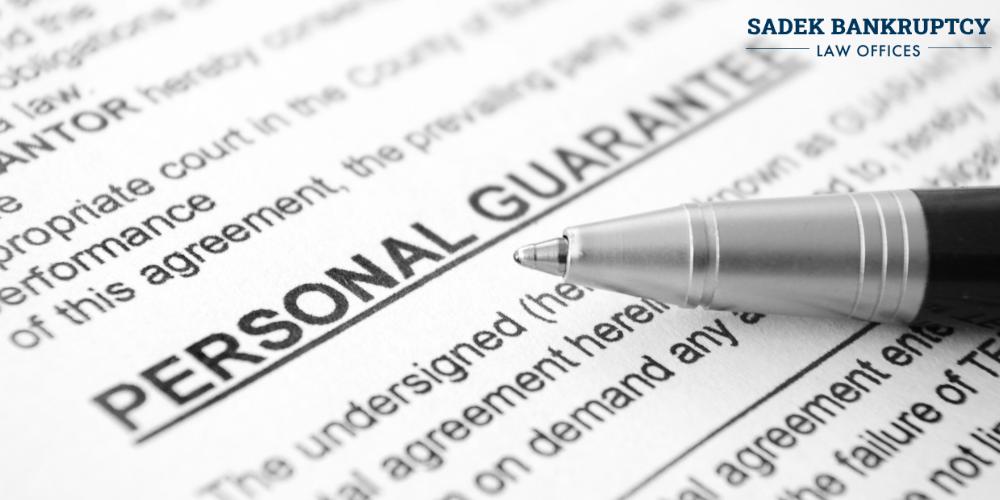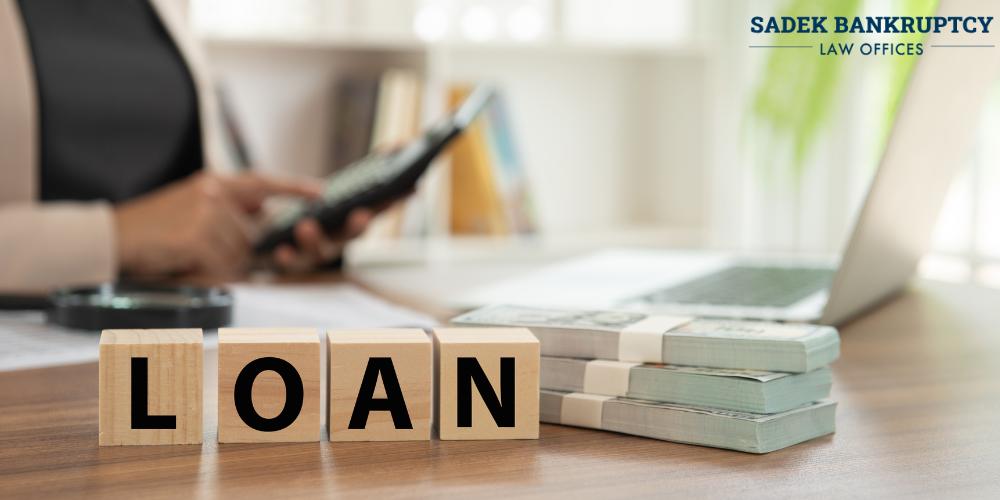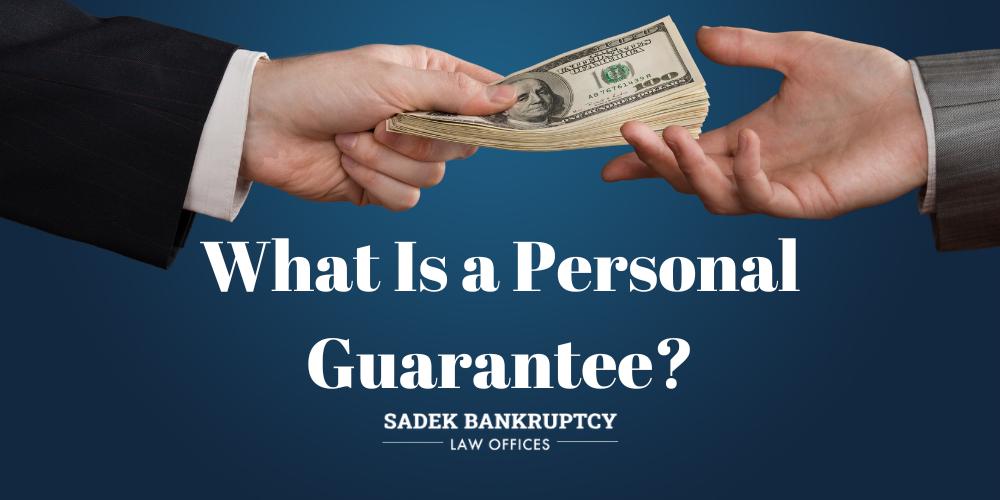Navigating the complex terrain of financial obligations can often lead to moments of uncertainty, especially when personal guarantees are involved. At Sadek Bankruptcy Law Offices, based in the heart of Philadelphia, we understand the weight of the decisions our clients face. A personal guarantee can significantly impact your financial landscape, binding you personally to the debts of your business or another entity. This commitment means your assets are on the line if the business fails to meet its financial obligations.
If you’re unsure about whether or not a personal guarantee will help or hurt you, it’s important to seek legal advice. Speaking with a Philadelphia bankruptcy lawyer can help you better understand your options and obligations, as well as protect your finances. To schedule a free consultation about your situation, please call Sadek Law today at 215-545-0008.
What Is a Personal Guarantee on a Loan?
Personal guarantees on loans are legal commitments that allow lenders to hold individuals personally liable for debts if the primary borrowers fail to repay their loans. This type of guarantee is often required by lenders when the borrowing entity—be it a small business, startup, or another type of organization—lacks the credit history or assets to secure a loan on its own. By signing a personal guarantee, the guarantor agrees to assume responsibility for the loan, essentially promising to repay the debt from their personal assets if the original borrower defaults.
How Do Personal Guarantees Work?
Personal guarantees work by legally extending the responsibility for a debt beyond the borrowing entity to an individual, typically a business owner or executive. This means if the business cannot repay its loan, the individual guarantor becomes personally responsible for satisfying the debt.
When a business applies for a loan, line of credit, or lease, the lender may determine that the business alone doesn’t provide sufficient security for the debt. The lender will then require a personal guarantee from one or more of the business’s principals. This requirement is formalized in a legal document that the guarantor must sign, indicating their understanding and agreement to the terms.
The specific terms of a personal guarantee can vary widely. Some guarantees are limited, setting a cap on the amount or percentage of the debt the guarantor is responsible for, while others are unlimited, giving the guarantor personal liability for the full amount of the debt, plus any additional fees or legal costs incurred if the debt goes unpaid.
If the business fails to make payments on the debt, the lender will first seek to recover the owed amount from the business itself, using any collateral that was pledged. If those efforts are insufficient, the lender will then turn to the personal guarantor to cover the remaining debt. This can involve legally pursuing the guarantor’s personal assets, such as savings accounts, investments, real estate, and other valuable property.
What Is a Guarantor on a Loan?
A guarantor on a loan is an individual or entity that legally agrees to repay the borrower’s debt should the borrower fail to fulfill their financial obligations under the terms of the loan agreement. Guarantors are typically involved in situations where the borrower’s credit history, income, or financial stability does not meet the lender’s requirements for a loan or credit extension on its own merit.
Types of Personal Guarantees

Personal guarantees can vary significantly in their scope and the extent of liability they impose on the guarantor. Understanding the differences is crucial for both guarantors and borrowers as they navigate the terms of financial agreements. The main types of personal guarantees include limited personal guarantees, unlimited personal guarantees, continuing guarantees, and guarantees with specific carve-outs.
Limited Personal Guarantees
A limited personal guarantee sets a specific limit on the amount of money the guarantor is responsible for repaying. This type is often used for business partners or when multiple individuals serve as guarantors of a single loan.
The limit can be a fixed amount or a percentage of the loan value, offering some level of protection to guarantors by ensuring they are not held responsible for more than their agreed share of the debt. This setup is particularly appealing in scenarios where guarantors want to mitigate potential financial exposure.
Unlimited Personal Guarantees
In contrast, an unlimited personal guarantee does not cap the guarantor’s liability. The guarantor is on the hook for the entire loan amount, including interest, fees, and legal costs, should the borrower default.
An unlimited guarantee represents a higher risk to the guarantor but provides greater security to the lender. It’s commonly required for small business loans, where the lender wants to ensure they have a robust mechanism to recover the borrowed funds.
Continuing Guarantees
Continuing guarantees are designed to cover a series of transactions or ongoing financial obligations. This type of guarantee is not limited to a single loan but applies to any current and future debts incurred by the borrower up to a specified limit or for a specified duration.
It’s particularly common in commercial transactions or lines of credit, where the business’s borrowing needs can fluctuate over time. A continuing guarantee ensures the lender has ongoing security for the varying amounts borrowed under the same agreement.
Carve-Outs
Carve-outs are specific conditions or scenarios outlined within a personal guarantee that can modify the guarantor’s liability. These clauses are typically found in unlimited guarantees and serve to protect the guarantor from being responsible for certain debts or obligations should specific agreed-upon conditions not be met.
For example, a carve-out might stipulate that the guarantor is not liable for debts incurred if the lender fails to follow agreed-upon lending practices or if the borrower fraudulently increases their debt without the guarantor’s knowledge.
Should I Sign a Personal Guarantee?

Deciding on whether signing a personal guarantee is the right choice for you should involve careful consideration. It’s important to weigh the potential risks against the benefits if you’re considering signing a personal guarantee for a business loan, personal loan, or other loan. Some of the benefits of personal guarantees include the following.
- Access to Financing: Often, a personal guarantee is a key that unlocks access to critical financing, especially for startups and small businesses that might not qualify if they don’t have the business assets. This can be an essential step in growing a business or pursuing new opportunities.
- Better Terms: Providing a personal guarantee can sometimes result in more favorable loan terms, including lower interest rates or more flexible repayment options because it lowers the risk for the lender.
How Can I Reduce the Risks of a Personal Guarantee?
Just as personal guarantees have benefits, they also come with a certain degree of risk. The most important risks to be aware of include the following.
- Personal Liability: Remember, signing a personal guarantee means you could be personally responsible for repaying the debt if the primary borrower or business defaults. This could impact your personal assets, including savings, property, and other investments.
- Credit Impact: Your personal credit score could be affected if the borrower defaults and you are unable to fulfill the debt obligations under the guarantee. This can have long-term implications for your ability to obtain personal loans, mortgages, or even other business financing in the future.
- Relationships: If you are guaranteeing a loan for a business venture involving partners or family members, consider how the financial stress of potential liability might affect these relationships.
How Might a Personal Guarantee Affect My Credit?
A personal guarantee can have a significant impact on your credit history, both in terms of your personal credit scores and your ability to borrow in the future. Understanding these implications is crucial before you decide to sign a personal guarantee.
Initially, if the borrower (be it a business or individual) makes timely payments, the personal guarantee may not directly appear on your personal credit report, especially if the loan is in the name of a business. However, this can vary by lender and the type of loan.
If the borrower defaults on the loan, and you, as the guarantor, are unable to fulfill the debt obligation, this failure to pay will likely be reported to the credit bureaus. Such negative information can significantly lower your credit score.
Being responsible for the defaulted loan increases your debt-to-income ratio, a key factor lenders consider when you apply for personal credit or loans. A higher ratio can make it more difficult to obtain financing in the future.
If the lender takes legal action against you to recover the debt and wins a judgment, the judgment could also appear on your credit report, further damaging your credit score.
What Loans or Lenders Might Require Personal Guarantees?

Personal guarantees are a common requirement across various types of loans, particularly when the borrower is a small business, startup, or limited liability company (LLC), or when an individual borrower has a less-than-ideal credit history. Lenders use personal guarantees to reduce the risk of lending by providing an additional layer of security. Various loan agreement types that may involve personal guarantees include the following.
Business Auto Loans
When a business needs to finance the purchase of vehicles, lenders might require a personal guarantee, especially if the business is relatively new or lacks a substantial credit history and business collateral. This guarantee assures the lender that if the business fails to make payments, the individual guarantor will cover the debt. It’s a common requirement for small businesses seeking to acquire vehicles for operational purposes, as it provides the lender with a recourse in case of non-payment.
Personal Loans
For individual borrowers seeking personal loans, lenders might request a personal guarantee in situations where the borrower’s credit history is weak, income is variable, or debt-to-income ratio is high. While the term “personal guarantee” might not be explicitly used since the loan is already personal in nature, the principle is the same: the borrower is pledging their personal assets or creditworthiness to secure the loan. In cases where the loan is for a specific purpose related to the borrower’s business, this guarantee provides extra assurance to the lender.
Business Loans
Business loans, particularly those for small and medium-sized enterprises (SMEs) or startups, frequently require personal guarantees from the owners or major shareholders. This is because these businesses might not have the extensive financial history, personal savings, or assets that larger companies do, making them riskier for lenders. The personal guarantee acts as a pledge from the business owner or owners that they will be personally liable for the loan if the business cannot repay it, thus making lenders more comfortable with extending credit.
Business Lines of Credit
Similar to business loans, business lines of credit often require a personal guarantee, especially for small business owners. A line of credit is a flexible financing solution that allows businesses to draw funds up to a certain limit and pay interest only on the amount used. Given its flexible nature, lenders require a personal guarantee to ensure that they have a means of recouping any extended credit if the business’s cash flow is unable to cover the repayment.
Are SBA Loans Personally Guaranteed?

Yes, in most cases, Small Business Administration (SBA) loans are personally guaranteed. The SBA doesn’t typically lend directly to businesses but instead guarantees loans made by approved lenders, such as banks and credit unions. While the SBA’s guarantee mitigates some of the risk for the lender, it’s common for the lender to require a personal guarantee from the business owner(s) as well.
What Are Alternatives to Personal Guarantees?
While personal guarantees are a common requirement for many types of loans, there are alternatives that borrowers can explore to limit their personal liability. These alternatives provide additional security for lenders while potentially reducing the risks borne by the borrower.
Some popular alternatives to personal guarantees include collateral-based financing, co-signers or co-borrowers, business-based guarantees, and negotiating terms and conditions. We strongly recommend that you seek legal advice before making any concrete decisions.
- Collateral-Based Financing: Rather than relying solely on personal guarantees, borrowers can offer collateral to secure a loan. Collateral can be any valuable asset that the borrower owns, such as real estate, vehicles, equipment, or inventory. By pledging collateral, the borrower provides the lender with a tangible asset to seize and sell in the event of default, reducing the need for a personal guarantee.
- Co-Signers or Co-Borrowers: Another alternative to personal guarantees is to involve co-signers or co-borrowers who share the responsibility for repaying the loan. Co-signers are individuals who agree to be equally responsible for the debt and are equally liable for repayment if the borrower defaults. Co-borrowers, on the other hand, are joint borrowers who share ownership of the loan proceeds and are jointly responsible for repayment.
- Business-Based Guarantees: In some cases, lenders may accept business-based guarantees instead of personal guarantees. This type of guarantee relies on the financial strength and assets of the business itself rather than the personal assets of the borrower.
- Negotiating Terms and Conditions: Borrowers can also explore negotiating the terms and conditions of the loan to minimize the need for personal guarantees. This might involve requesting lower loan amounts, shorter repayment terms, or higher interest rates in exchange for reducing or eliminating the personal guarantee requirement.
How Can I Get Rid of a Personal Guarantee?

It can be challenging to get rid of a personal guarantee, but it is far from impossible. Some of the most common strategies for getting rid of personal guarantees include the following.
- Refinancing the loan
- Paying off the loan early
- Negotiating with the lender
- Restructuring the business
- Seeking legal advice
- Filing for bankruptcy
Contact Sadek Bankruptcy Law Offices Today
Understanding the intricacies of personal guarantees is vital for anyone navigating the realm of business or personal financing. At Sadek Bankruptcy Law Offices, we recognize the importance of informed decision-making when it comes to financial matters.
Whether you’re a business owner considering a loan or an individual seeking personal financing, knowing the implications of a personal guarantee is essential to safeguarding your financial well-being. If you find yourself facing challenges related to personal guarantees, our team of experienced attorneys is here to provide guidance and support.
With our experience in bankruptcy law and debt relief solutions, we can help you explore options for managing or alleviating the burdens associated with personal guarantees. Contact us today to schedule a free consultation and take proactive steps toward securing your financial future.





